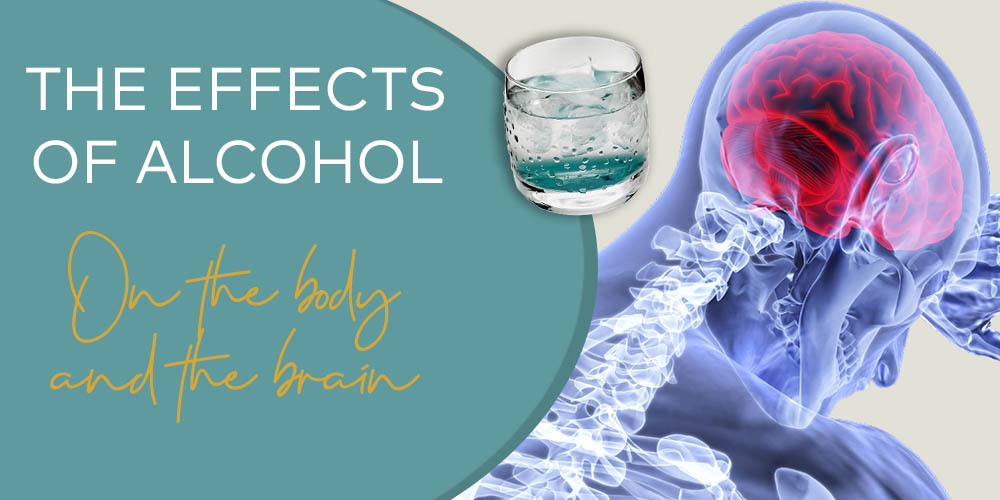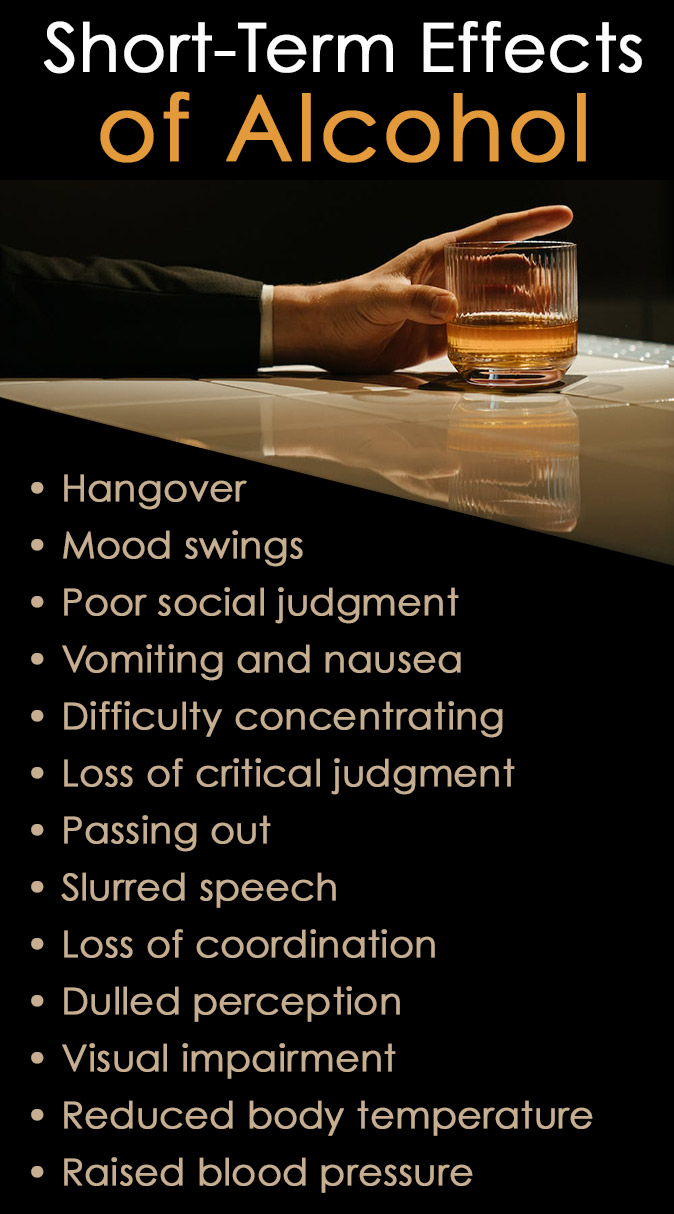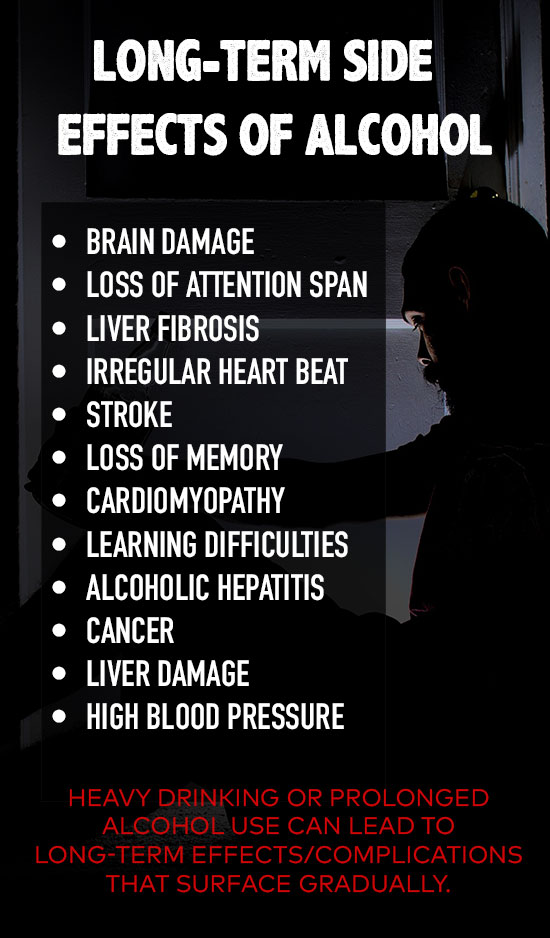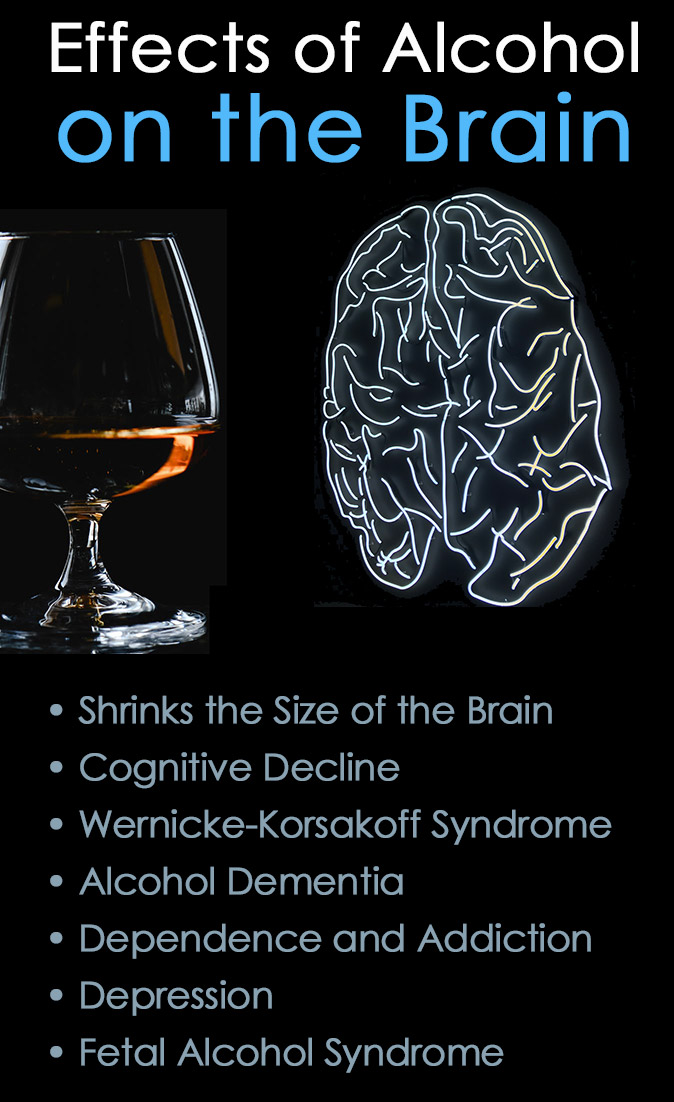Even though alcohol consumption is widely accepted in society, there are many negative side effects of alcohol on the body and brain.
Whether it’s a glass (or two) of wine in the evening or simply a few beers after work, it is normal for many people to regularly drink alcohol despite the health risks.

According to the 2018 National Survey on Drug Use and Health (NSDUH) by SAMHSA, over 86.3% of American adults reported having indulged in alcohol consumption at one time in their lifetime.
Another 26.45% engaged in binge drinking within the past month.
Most alcoholism statistics point to a high prevalence of alcohol use in the United States, even though awareness of the health consequences and negative effects of alcohol are widely known.
Prolonged or excessive use of alcohol has been shown to cause addiction, known as alcohol use disorder, as well as numerous short and long-term effects of alcohol on the body and brain.
Figures from the 2018 NSDUH show that more than 14 million adults in the U.S. suffer from an Alcohol Use Disorder (AUD). Unfortunately, only 7.9% of those diagnosed with AUD sought treatment.
Even more concerning is the fact that approximately 88,000 people lose their lives annually from alcohol-related deaths, which currently makes it the 3rd leading cause of preventable deaths.
Drawing on the prevalence and risks of drinking, it’s important to understand the effects of alcohol on the body and brain.
Understanding the Effects of Alcohol
The term “alcohol” largely refers to ethanol, which is the psychoactive ingredient that causes intoxication.
Essentially, ethanol is a toxin that creates the powerful effects of alcohol on a person’s mental state and mood.
Alcohol is metabolized in the liver, and its main function is to neutralize and eliminate toxic substances in the body.
However, the liver is limited in its capacity to process alcohol in the system. For most people, the liver metabolizes one standard drink every hour.
A standard alcoholic drink is defined as 12 ounces of beer with 5% ABV or 5 ounces of wine with 12% ABV.
Drinking more than the liver’s processing capacity leads to an accumulation of alcohol in the blood and body tissue.
As a person’s Blood Alcohol Concentration (BAC) increases, the side effects of alcohol on the body and brain also increase.
Keep in mind that the extent to which alcohol affects the body and brain depends on several factors such as family history, frequency and quantity of alcohol consumed, age, gender, and overall health.
Short-Term Effects of Alcohol
Many of the short term effects of alcohol will usually subside within a few days after a person stops drinking.
There are several factors that contribute to the severity of issues associated with drinking, such as the amount and duration of alcohol use, a person’s age, body weight, type of alcohol, and how much food was eaten before and during drinking.
One of the most common short-term side effects of alcohol is experiencing a hangover after a person stops drinking. Some hangovers are mild, while others can lead to extreme discomfort, depending on the amount ingested.
Mild side effects of alcohol after a night of drinking often lead to a headache, feeling tired or sluggish, dehydrated, and nausea.
Some people wake up with hangover anxiety from too much alcohol, although this usually passes within a few days after sobering up.
Getting blackout drunk is almost a sure sign a person will feel a more extreme hangover the next day.
Excessive or binge drinking causes more profound negative side effects of alcohol, even if it only happens once in a while.
When a person experiences alcohol poisoning symptoms the next day after getting drunk, it might be a sign of a serious drinking problem.

Short-Term Effects on the Body and Brain
- Hangover
- Mood swings
- Poor social judgment due to lowered inhibitions
- Vomiting and nausea
- Difficulty concentrating
- Loss of critical judgment
- Passing out
- Slurred speech
- Loss of coordination
- Dulled perception
- Visual impairment
- Reduced core body temperature
- Raised blood pressure
Heavy drinking or prolonged alcohol use can lead to long-term alcohol side effects and complications that surface gradually.
Long-Term Side Effects of Alcohol on the Body and Brain
The long-term side effects of alcohol use can lead to serious health issues that may require medical treatment.
Unlike the short-term issues that usually subside quickly, excessive or prolonged drinking can cause a variety of medical and health conditions.
Health Conditions Caused by Alcohol Include:
- Anxiety and Depression
- Alcohol Withdrawal Symptoms
- Diabetes
- Wernicke-Korsakoff Syndrome
- Alcohol Related Dementia
- Alcoholic Neuropathy
- Fetal Alcohol Syndrome
- Delirium Tremens
- Some Types of Cancer
All of these conditions will have a profound impact on an individual’s quality of life.
If not treated properly, these problems will affect a person’s physical and mental health and lead to a range of other issues with the body and brain.
Long-Term Side Effects of Alcohol
- Brain damage
- Loss of attention span
- Liver fibrosis
- Irregular heart beat
- Stroke
- Loss of memory
- Cardiomyopathy
- Learning difficulties
- Alcoholic hepatitis
- Cancer (Esophageal, breast, colorectal, mouth, throat, larynx, liver)
- Liver damage
- High blood pressure

What are the Effects of Alcohol on the Brain?
Most people are aware that the effects of alcohol on the brain result in feelings of elevated mood and a decrease of inhibitions. But there’s more to it than just getting a buzz.
When a person consumes alcohol, it is absorbed into the bloodstream through the stomach and small intestines. It then travels to various organs in the body, including the liver, where it is metabolized.
Unfortunately, if the liver is overwhelmed, the excess alcohol travels back to the body.
Subsequently, alcohol moves to the central nervous system where it can cross the blood-brain barrier. Here it directly interacts with the billions of interconnected neurons in the brain.
Because it is a depressant, alcohol inhibits the signals sent between the neurons and also impairs certain automated processes such as information processing and balance.
Other effects of alcohol on the brain include interacting with GABA receptors, affecting reaction time, and causing lethargic movements and slurred speech.
Alcohol also causes the release of dopamine, which is associated with the warm, fuzzy feeling most users seek.
While some effects of alcohol on the brain are short-term and they wear off quickly, others persist, leading to impaired brain function and the deterioration of a person’s mental health.
Impact of Alcohol on the Brain
Shrinks the Size of the Brain
A study published in the Archive of Neurology suggests that excessive consumption of alcohol over a prolonged period shrinks the size of the brain.
The findings of the study showed that people who consumed 2 drinks every day for 20 years had smaller brains than those who didn’t indulge in alcohol.
Cognitive Decline
Some people drink a little too much on a night out and can barely recall the last few hours before going to bed.
We know that binge drinking may lead to memory loss. But a study in the Journal of Neurology shows that prolonged use of alcohol speeds up cognitive decline by up to 6 years.
Wernicke-Korsakoff Syndrome – Wet Brain
“Alcoholic Wet Brain” is a term used to describe the dementia-like symptoms seen in heavy drinkers. Scientifically, it’s known as Wernicke-Korsakoff Syndrome, which is a combination of two conditions, Wernicke encephalopathy and Korsakoff’s syndrome.
It’s a form of alcohol dementia mainly caused by an alcohol use disorder. Wernicke-Korsakoff stems from a deficiency of thiamine (Vitamin B1).
Most alcoholics tend to have a thiamine deficiency due to poor diet and alcohol’s ability to inhibit its effective absorption.
Alcohol Dependence and Addiction
Studies show that alcohol dependence and addiction is a huge risk factor for diseases and one of the leading causes of disability in the United States. Prolonged use of alcohol causes unhealthy chemical changes in the brain.
Alcohol interacts with a group of receptors known as GABA (gamma-Aminobutyric acid), which help regulate the release of endorphins, also known as the “feel-good” chemicals.
This creates a feeling of euphoria and an increased desire for more alcohol to maintain the feeling. Over time, alcohol stops producing the same effects as the brain builds a tolerance.
Depression
According to a study published in Addiction, there’s a close and complex association between depression and alcohol intake.
Several scientific sources point to a causal relationship between the two, with each exuberating the symptoms of the other.
Whereas some people may turn to alcohol as a way of self-medication to find temporary relief for their depressive symptoms, alcohol may also increase the risk of falling into depression.
This is known as a co-occurring disorder and it requires integrated dual diagnosis treatment to address both the depression and alcohol addiction at the same time.
Fetal Alcohol Syndrome
According to an article appearing in Pediatric Respiratory Reviews, alcohol abuse is the main preventable cause of birth defects in America.
Alcohol has been shown to travel across the placenta to the fetus. This significantly increases the risk of Fetal Alcohol Syndrome, which is characterized by the following symptoms:
- Learning problems
- Hyperactivity
- Bone, kidney, and heart disorders
- Distinct facial features
- Less-than-average weight and height
- Small head size
- Low IQ
- Sleeping problems
- Poor hearing or vision
- Miscarriage
- Still birth
Pregnant or breastfeeding women are strongly advised against drinking alcohol. There is no safe level of alcohol consumption during pregnancy due to the risk of damaging the baby’s brain.

What are the Effects of Alcohol on the Body?
The effects of alcohol on the body start from the moment a person takes his or her first drink. The alcohol is quickly absorbed into the bloodstream before interacting with the organs and other areas of the body.
Liver
As the first line of defense against the toxicity of alcohol, the liver often suffers significant damage from the effects of alcohol. Long-term alcohol use increases the risk of liver disease and inflammation.
Inflammation of the liver causes cirrhosis, which is an irreversible scarring of tissue. The scar tissue gradually damages the liver function, hindering its ability to eliminate toxins from the body.
Similarly, liver disease leads to a build-up of waste and toxins in the body because the organ’s function is severely hindered.
Sexual and Reproductive Health
Contrary to widespread assumption, alcohol is not an aphrodisiac, and it is actually quite the opposite. While it may reduce a person’s impulse control and lower social inhibition, alcohol has been shown to reduce sexual performance.
In a study appearing in the Indian Journal of Psychiatry, the findings showed that 72% of subjects diagnosed with alcohol dependence “had one or more sexual dysfunctions, the most common being premature ejaculation, low sexual desire and erectile dysfunction.”
The study concluded that the amount of alcohol consumed was the “most significant predictor of developing sexual dysfunction.”
In women, alcohol increases the risk of ovulation and menstruation disorders, including irregular or heavy periods.
It also puts unborn babies at increased risk of developmental disorders such as Fetal alcohol syndrome disorders (FASD).
Body Weight
Each gram of alcohol consumed can add as many as 7 calories, which makes it one of the most calorie-rich nutrients.
However, the effects of alcohol on weight are varied. For some people, especially wine drinkers, alcohol may cause weight loss.
For others such as beer drinkers, it can lead to weight gain or a beer belly.
A study published in the Journal of Obesity Research suggested that drinking habits may play a role in weight changes. According to the findings, there was no noticeable association between light to moderate drinking and weight gain, whereas heavier drinking was show to lead to increased weight gain.
Heart Health
Heart disease is a broad category of cardiovascular diseases. It is the leading cause of death in the world, accounting for more than 15 million deaths worldwide and approximately 647,457 deaths in the United States.
Heavy drinkers have a higher risk of heart complications such as:
- High blood pressure
- Irregular heartbeat
- Difficulty pumping blood
- Stroke
- Heart attack
- Heart failure
Type 2 Diabetes
Around 8% of the global population suffers from Type 2 diabetes. The condition is characterized by a reduced uptake of glucose (blood sugar)—leading to high levels of sugar in the blood.
Alcohol can increase complications due to diabetes in several ways. For one, it can hinder the function of the liver, which stores glycogen (a form of glucose).
Alcohol can also cause hypoglycemia (low blood sugar), and also negatively interact with diabetes medication.
Digestive System
The negative effects of alcohol on the digestive system are often felt after the damage has already been done.
Aside from the short-term side effects of alcohol, like vomiting and nausea, it can also cause severe damage to the gastrointestinal system. Some effects include:
- Diarrhea
- A feeling of fullness
- Bloating
- Constipation
- Gassiness
- Ulcers (can be fatal if not treated early)
- Hemorrhoids
- Malnutrition – damage to the tissue hinders the ability to digest food properly
- Internal bleeding
- Cancer (colon, esophagus, throat, and mouth)
Immune System
According to a study in BMC Public Health, 10% of all tuberculosis cases in the world are linked to alcohol consumption.
When alcohol is consumed, the body immediately prioritizes its metabolization and elimination from the body. This takes up valuable resources that make it harder for the body to tend to other more important functions such as fighting pathogens.
Alcohol has also been shown to interfere with the diversity of microbes in the gut. These are microorganisms that are important for healthy immune function.
Skeletal System
The National Institute on Alcohol Abuse and Alcoholism (NIAAA) notes, “chronic heavy alcohol consumption, particularly during adolescence and young adulthood, can dramatically affect bone health and may increase the risk of developing osteoporosis (porous bones) later.” This increases a person’s susceptibility to fractures.
Seeking Treatment Before It’s Too Late
Many of the issues mentioned here can be reduced or mitigated by finding ways to stop drinking alcohol before it becomes a problem.
Hopefully, understanding the effects of alcohol on the body and the brain can be a motivating factor for many people to seek alcohol addiction treatment before it’s too late.
Related Posts
- Long Term Side Effects of Drugs and Addiction
There's a lengthy list of long-term side effects of drugs and addiction that affect both…
- Alcohol Blackout Drunk Causes, Dangers, Prevention
Ever been blackout drunk or had an alcohol blackout? That is, have your memories after…
- Is Addiction a Disease or a Choice?
Is addiction a disease? Is alcoholism genetic? Or is it simply a personal choice? These…
